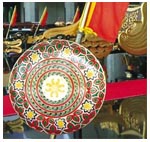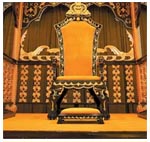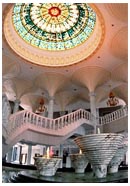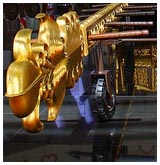|
---- Heritage -----
Monarchy
Bruneians are proud to have the worlds oldest reigning monarchy and centuries of royal heritage. At the helm of the only remaining Malay Islamic Monarchy in the world, the Sultan of Brunei come s from a family line that dates back over 600 years to 1405 when the first Sultan ascended the throne, founding a dynasty of which the current Sultan, His Majesty Sultan Haji Hassanal Bolkiah, is the 29th ruler. s from a family line that dates back over 600 years to 1405 when the first Sultan ascended the throne, founding a dynasty of which the current Sultan, His Majesty Sultan Haji Hassanal Bolkiah, is the 29th ruler. The early history of the nations unique monarchy can be pieced together from accounts taken from Chinese, Javanese and local Bruneian records. The first ruler, Sultan Muhammad Shah, known as Awang Alak Betatar, is said to be responsible for introducing Islam to Brunei, forever altering the course of the nations history and cultural landscape. The second ruler was Sultan Ahmad, followed by a third Arab Sultan, Sharif Ali, considered to be a descendant of the Prophet Mohammad. Also known as Sultan Berkat, he married the daughter of Sultan Ahmad and consolidated the monarchy with the Islamic faith. Following him was Sultan Sulaiman, who was succeeded by the most renowned ruler in Brunei's early history, Sultan Bolkiah. Under the rule of Sultan Bolkiah, Brunei began to expand into an empire, with territorial holdings that would eventually encompass the island of Borneo and parts of the Philippines. Brunei's golden age centred on the reign of two remarkable rulers, Sultan Bolkiah and Sultan Hassan. Under their rule, Bruneis Royal Court developed a splendour rivalling that of any other monarchy in the world, and the territorial and cultural influence of the country reached its peak. Visitors today can still marvel at the dignity of Bruneis Golden Age as a great deal of historic relics from the era have been carefully preserved. In 1888, Brunei became a British protectorate and in 1906, the British Residential System was introduced. Brunei was eventually granted internal self-government, and Sultan Omar Ali Saifuddien promulgated the nations new Constitution on 29 September 1959. In 1967, the current Sultan, His Majesty Sultan Haji Hassanal Bolkiah Mu'izzaddin Waddaulah was made the 29th ruler of Brunei Darussalam, leading the nation achieving its independence in 1984. The Sultan declared Negara Brunei Darussalam ("Brunei, The Abode of Peace") as a sovereign, democratic and independent Malay Muslim Monarchy (Melayu Islam Beraja) which would be administered according to the teachings of Islam. Islamic Heritage
 With over two thirds of its population professing the Islamic faith, Brunei is ruled according to the national philosophy of the Malay Islamic Monarchy, intertwining Malay traditions with Islam and deep-rooted respect for the nations monarchy. Bruneians practice a devout but tolerant brand of Islam, which encompasses sincere respect and devotion, while still remaining open to other faiths and beliefs. With over two thirds of its population professing the Islamic faith, Brunei is ruled according to the national philosophy of the Malay Islamic Monarchy, intertwining Malay traditions with Islam and deep-rooted respect for the nations monarchy. Bruneians practice a devout but tolerant brand of Islam, which encompasses sincere respect and devotion, while still remaining open to other faiths and beliefs. Modern scholars date the spread of Islam to Brunei Darussalam to the late 13th century. Prior to this, ancient Malay Culture was based on animistic and Indic culture. Islam gradually eroded these elements and thus, todays Malay culture is now more identifiable with Islam. Visitors to Brunei will see that Islamic influences form a central foundation of the nations heritage. As Islam is the foundation for the life of the average Bruneian, many of the nations cultural practices and customs are intrinsically linked with religion. Aesthetically, Islam introduced important architectural features such as the ubiquitous mosques and art styles such as the tile mosaics seen throughout the nation. Other culturally enriching additions include the use of Jawi script, the abundance of religious texts and even foods and cooking styles.
Monuments & Landmarks
Nearby, the Mausoleum of Sultan Bolkiah pays tribute to one of Bruneis greatest Sultans, who reigned at the height of Bruneis sovereignty in the region. It is a peaceful area in a quiet alcove of greenery and exudes the deep respect of the Bruneian people for their rich heritage. The capital also houses a number of royal museums highlighting the nations 600-year old monarchy and century-spanning history. Perhaps the most well-known is the Royal Regalia Museum, where visitors can glimpse the Sultans full royal regalia, including the crown and royal chariot, along with a vast collection of opulent treasures. A visit to the Brunei Museum is also a must, with its elaborate displays of antique cannons and intricate daggers, a large private collection of gilded Holy Korans, Borneo ethnographic displays and treasures unearthed from shipwrecks off Bruneis coasts. Meanwhile, the Brunei History Centre contains genealogical records detailing the origins of the Royal Family and other historical documents significant to the nation.
 |
Pictures and Information courtesy of Tourism Brunei.
All information contained herein is correct at time of production.
Tourism Brunei and sinisini.com cannot be held responsible for any inaccuracy, ommission or alteration that may occur. |
|
